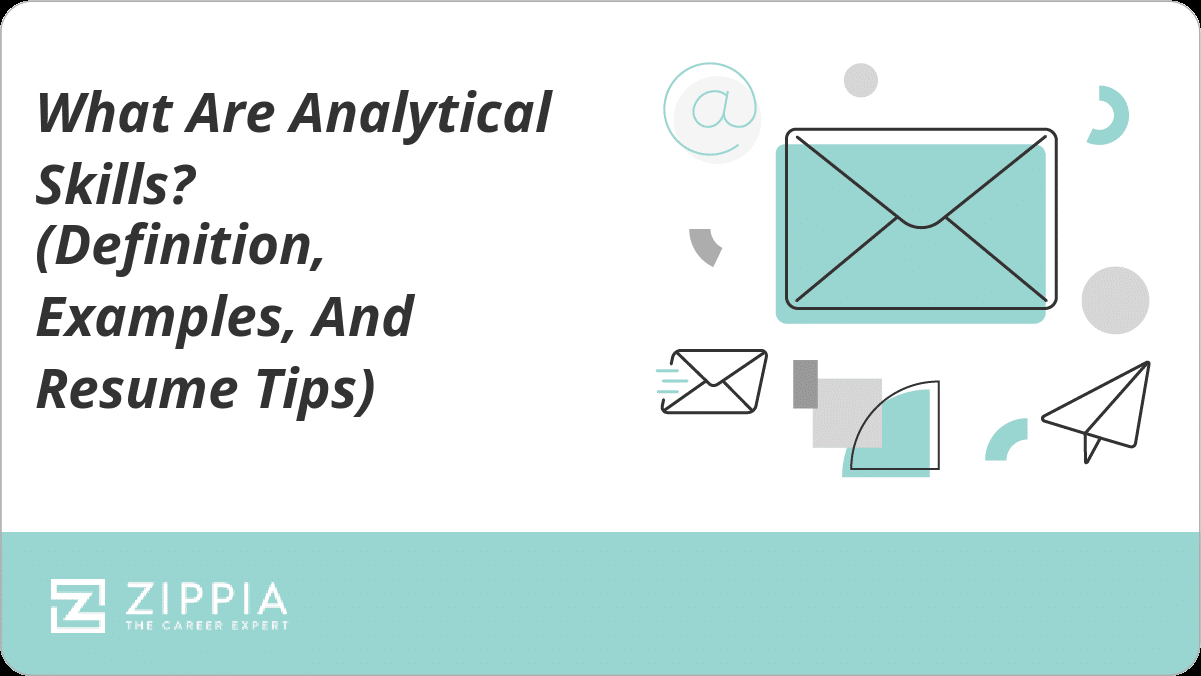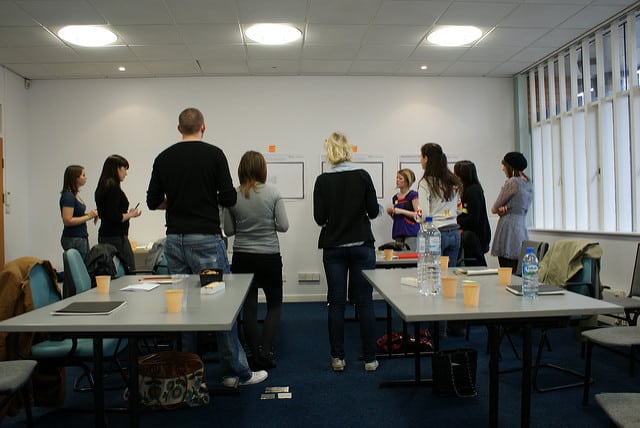- Hard Skills
- What Are Hard Skills?
- What Are Technical Skills?
- What Are What Are Life Skills?
- What Are Social Media Skills Resume?
- What Are Administrative Skills?
- What Are Analytical Skills?
- What Are Research Skills?
- What Are Transferable Skills?
- What Are Microsoft Office Skills?
- What Are Clerical Skills?
- What Are Computer Skills?
- What Are Core Competencies?
- What Are Collaboration Skills?
- What Are Conflict Resolution Skills?
- What Are Mathematical Skills?
- How To Delegate
Find a Job You Really Want In
Summary. Analytical skills are used to assess situations and make plans to overcome obstacles, usually in structured, logical ways.
There are a few skill sets that are important to hone no matter what industry you work in, and analytical skills are one of those.
In this article, you’ll learn about several different types of analytical skills, how to highlight them when applying for a job, and how to improve your analytical skills.
Key Takeaways
-
Analytical skills are necessary for figuring out how to overcome obstacles and make wise decisions.
-
Some examples of analytical skills are data analysis, research, critical thinking, communication, problem-solving, visualization, and creativity.
-
You should highlight your analytical skills on your resume, in your cover letter, and during your interviews.
-
It’s important to work to grow your analytical skills throughout your career.

- What Are Analytical Skills?
- Types of Analytical Skills
- Additional Analytical Skills
- Examples of How to Showcase Your Analytical Skills
- Examples of Resumes That Showcase Analytical Skills
- Example of Analytical Skills in a Cover Letter
- Examples of Analytical Skills in a Job Interview
- Examples of Analytical Skills on the Job
- How to Improve Your Analytical Skills
- Analytical Skills FAQs
- Final Thoughts
- References
- Sign Up For More Advice and Jobs
What Are Analytical Skills?
Analytical skills are the qualities you possess that help you to assess situations rationally, create effective plans, and overcome obstacles. Analytical thinkers can separate themselves from their emotions in order to work effectively. They usually utilize a process to break down large problems into smaller issues to tackle.
There are a variety of traits and abilities that fall under the heading of strong analytical skills. Drawing attention to your strengths in analytical thinking can grab an employer’s attention, and land you an interview or a promotion.
Choose From 10+ Customizable Resume templates
Zippia allows you to choose from different easy-to-use resume templates, and provides you with expert advice. Using the templates, you can rest assured that the structure and format of your resume is top notch. Choose a template with the colors, fonts & text sizes that are appropriate for your industry.
Types of Analytical Skills
Some analytical skills may be more relevant to your field than others. Take some time to consider which qualities will be the most valuable to your potential employers. Below are some great examples of important analytical thinking that hiring managers look for on your resume.
-
Data analysis. Taking in information, making sense of it logically, and using it to the best of your abilities is an important step in making calculated decisions.
Having impressive skills in data analysis greatly supports analytical thinking. Considering they share a root word in common, it makes sense that these skills rely on each other.
Data analysis could mean very different things for varying occupations.
If you work for a retail company, it could mean:
-
Examining quarterly clothing sales
-
Considering why the numbers are what they are, and if that’s satisfactory
-
Researching possibilities for how to increase revenue
-
Make decisions about whether to stay on the current trajectory or make changes to increase sales
-
Following-up
If you own a blog, it could mean:
-
Reading your website’s Google Analytics for each post
-
Determining increases or decreases in traffic and why that may be
-
Including traffic data points in a spreadsheet to consider trends
-
Coming up with strategies to boost website traffic based on success trends
-
Continually updating analytic data
Contemplate where your data analysis skills come in handy, and how you could develop these skills to make yourself an even more competitive applicant.
-
-
Research. Conducting worthwhile research is very important in building viable solutions. Once you’ve noticed an issue or a way things could be done better, you must look for solutions towards improvement.
That depends on research. Luckily, we live in the age of the internet. Quite literally, we have a world of information available at our fingertips. You’re living proof of this — just look at what you’re doing right now by reading this article.
Carrying out research on important analytical skills, in order to improve your resume and employee profile. Using detailed research in your work style enhances your analytical problem-solving process.
Research involves:
-
Utilizing reliable resources
-
Fact-checking
-
Having an informational goal in mind
-
Attention to detail
-
Staying focused
-
Organizing data
-
Effectively presenting results
-
-
Critical thinking. Critical thinking is the boat that keeps the rest of your analytical skills afloat. It’s largely about having logic and reason at work.
It also involves always being open to learning more. Critical thinkers draw practical connections to further a company’s success. This is an extremely valuable skill for employers because critical thinkers can:
-
Determine why issues arise
-
Assess the strengths and weaknesses of a particular strategy
-
Deciphering complex issues into smaller steps
-
Develop logical plans
-
Efficiently solve problems
-
Articulate their thinking to others
-
-
Communication. You may have the ability to deep-dive into research and think critically about the results. However, this isn’t very helpful without being able to accurately translate these findings to others.
Communication is key to developing workplace relations and completing projects productively. Throughout the analytical problem-solving process, be sure to keep your co-workers and supervisors in the loop about everything you’re doing and the conclusions you’re drawing. They could have input that affects your course of action or expands on your ideas.
Communication skills involve:
-
Friendliness
-
Listening to others
-
Asking questions
-
Trust
-
Accepting and returning feedback
-
Paying attention to non-verbal communication
-
Coordination
-
Presentation
-
Following-up on past interactions
-
-
Problem-solving. Problem-solving skills may sound synonymous with analytical, but really, it’s just another skill involved in the analytical process. Employers seek to hire applicants who are adept at problem-solving to handle any unexpected circumstances or issues.
After identifying an issue and conducting proper research, brainstorming potential solutions is next. You use problem-solving abilities to organize all the information you’ve uncovered to produce a logical plan for action.
Problem-solving skills involve:
-
Data analysis
-
Research
-
Consulting multiple sources
-
Strong communication
-
Coordination
-
Formulating strategy
-
Time management
-
Creativity
-
Visualization. One of the traits that make for a strong analytical thinker is a visualization for an end goal. Having a clear vision in mind is necessary for creating a plan that works well. After all, you have to know what outcome you’re looking for to analyze whether it was successful later.
Without an objective, your research and strategy can become disorganized. Throughout the analytical process, keeping your original goal in mind can make your analytical work more productive.
Goal visualization involves:
-
Taking data into account
-
Acknowledging your team’s strengths and weaknesses
-
Deciding what your team’s overall goal is
-
Discussing the best routes for achieving this objective
-
-
Creativity. Creative thinkers have the ability to formulate new ideas and ways of doing things. This can be extremely productive when using analytical reasoning skills.
A large component to coming up with effective solutions to problems that involve innovation. Creative employees make groundbreaking improvements from problems.
Creativity involves:
-
Imagination
-
Asking questions
-
Keeping goals in mind
-
Curiosity
-
Problem-solving
-
Experimentation
-
Patience
-
Transforming ideas into action
-
Additional Analytical Skills
Other useful analytical skills include:
-
Time-Management
-
Comparison
-
Recognizing achievements
-
Providing feedback
-
Computer skills
-
Clarification
-
Organization
-
Resilience
-
Planning
-
Dedication
Examples of How to Showcase Your Analytical Skills
There are four main ways to showcase your analytical skills as part of your job search:
Examples of Resumes That Showcase Analytical Skills
-
47 Martin Ln.
Orlando, FL, 44587
(771)-409-3376
ShelbyMalcolm@gmail.comShelby Malcolm
Passionate and creative graphic designer with 4 years of experience and a B.A. in Design. Strong communication and problem-solving skills.
SKILLS
-
Adobe Photoshop
-
Adobe Illustrator
-
Proficient in Inkscape
-
Creative
-
Dependable
-
Fast learner
-
Problem-solving
EXPERIENCE
Ecosphere Design Lab, Orlando, FL — Graphic Designer
March 2018 – PRESENT-
Outlining design concepts
-
Coordinating with a team of 6
-
Direct client requests
-
Illustration
-
Considering industry trends
-
Creating a range of ideas
-
Promoted from Junior graphic designer after the first six months
Innovation Graphics, Orlando, FL — Junior Graphic Designer
January 2015 – January 2018-
Communicating with clients
-
Providing customer service
-
Brainstorming idea for advertisements and logos
-
Utilizing revision when needed
-
Awarded a salary increase of 2% after the first year
EDUCATION
The University of Tampa, Tampa, FL — B.A. in Design
August 2011 – May 2015 -
-
Jacob Jones
912 W Evans St.
Sedona, AZ, 98211
(398)-197-1126
JacobJones23@gmail.com
LinkIn.com/in/JacobJonesOrganized and meticulous social media manager with 5+ years of experience. B.A. in Human Studies from the University of Arizona. Strengths in interpersonal skills and branding.
Professional Experience
Liberty Public Relations, Sedona, AZ
Social Media Manager September 2017-Present-
Scheduled and coordinated meetings
-
Interacted directly with clients
-
Coordinated with marketing teams
-
Manager profiles for several prominent clients
-
Created detailed plans for success with milestones of completion
-
Handled arising PR issues
-
Awarded $2,500 bonus after the first year
Gold Star Media Management, Sedona, AZ
Social Media Marketing Intern, June 2016– August 2017-
Memo creation and direction
-
Email management
-
Organizing social media post schedules
-
Analyzing post success
-
Collaborated on a team to design branding
-
Aided in brand creation for up-and-coming companies
Skills
-
Social media
-
Marketing
-
Branding
-
Google analytics
-
HTML
-
Attention to detail
-
Critical thinking skills
-
Adaptable
Education
University of Arizona, Tucson, AZ
BA in Human Studies, May 2016
GPA: 3.5 out of 4.0 -
-
Nicholas Phillips
Flexible and outgoing investigative journalist. Possess a Bachelor’s in English and a Masters in Journalism. Strong skills in creative thinking and problem-solving.
22 Main St.
Houston, TX, 23014
(129)-828-1192
NicholasPhillips@Gmail.com
NicholasPhillips.comEXPERIENCE
XYZ News Channel, Houston, TX — Investigative Journalist
April 2016 – PRESENT-
Search out newsworthy stories
-
Conduct relevant research
-
Communicating with co-workers and sources
-
Fact-checking
-
Interviewing subjects
-
Developing story outlines
-
Adhering to journalistic integrity
-
Promoting the success and viewership of XYZ
-
Awarded with two raises totaling $16,000
Houston Local News, Houston, TX — Journalist
January 2014-April 2016-
Thinking creatively to discover eye-catching stories and events
-
Gathering information and subjects via extensive research
-
Assessing lead quality
-
Meeting set deadlines
-
Coordinating with team of 10
-
Networking to establish working relationships
Around Town Quarterly, Houston, TX — Journalist Intern
June 2013- January 2014-
Assisting in administrative work
-
Conducting assigned research for topics
-
Contributing to weekly brainstorms
-
Editing and proofreading
-
Assisting in interviews
EDUCATION
The University of Texas, Austin, TX — Master’s in Journalism
September 2011 – June 2013The University of Tennessee, Knoxville, TN– Bachelor’s in English
August 2007-May2011.SKILLS
-
Research
-
Writing
-
Bilingual
-
Presentation
-
Integrity
-
Flexible
-
Sociable
LANGUAGES
Fluency in English and Spanish
-
Example of Analytical Skills in a Cover Letter
During my time as a Marketing Manager for XYZ Inc., I made it my mission to cut the budget while still growing our digital marketing presence. By recognizing that 80% of our traffic was coming from 20% of our content creators, I made the decision to cut our writing staff down significantly. What we saw was a 70% drop in spending on content creation, while traffic grew by an average of 24% monthly.
Other accomplishments from this role include:
Performed competitor keyword research to increase our organic reach by 29% YoY
Developed a website design in tandem with product team and based on user feedback to increase engagement by 76%
Identified and implemented best practices for email marketing and affiliate campaigns to increase conversion rates by 15% and revenue by 11%
Examples of Analytical Skills in a Job Interview
In a job interview, you’ll hear a lot of questions designed to test your analytical skills. Let’s go over a couple of common interview questions, along with example answers that clearly highlight your supreme analytical powers:
-
What KPIs do you find most valuable when assessing the success?
For me, it’s all about maximizing both efficiency and effectiveness. I independently track how much time each of my tasks takes, and what the return on that time investment is. For example, when my team had to code a whole new content cluster using a wildly different style than our home page, I started by assessing which features were most sought after by users.
I then implemented those changes and used A/B testing to determine the effectiveness. I found that adding trailing social engagement buttons along the left-hand side of the page upped engagement by over 20%, and it was a relatively simple thing to do. When you see that a huge chunk of your results come from small changes, it becomes easier to prioritize and identify the successful things you’re doing.
-
Walk me through you problem-solving process.
When I’m facing a problem I haven’t seen before, my first step is research. Whether that means looking online for tutorials covering the topic or speaking to an expert in the company, fact-finding is critical. Then, I like to implement imperfect changes — I say “imperfect” because I find many people suffer from “analysis paralysis.”
Instead, I’m happier to put out the minimal viable product and iterate from there. A lot of the time, the issues you expect from a problem never arise, and ones you never consider crop up unannounced. That’s why I feel more comfortable having an actual product to tweak and perfect, rather than trying to find the perfect solution the first time.
Examples of Analytical Skills on the Job
Whether you’re hoping to earn a promotion or leverage your analytical skills into a new job, one of the best ways to showcase your analytical skills is to let others do it for you. By that we mean you should make it so clear that you’re an analytical juggernaut at work that your supervisors recognize it as your stand-out trait.
In practice, that can take a few different forms. Here are some examples of how you can show off your analytical skills in your work:
-
Take on leadership roles.
-
Volunteer for assignments that give you a chance to hone and show off your capacity for analysis.
-
Go out of your way to improve an inefficient or ineffective process.
There’s not a job out there that doesn’t utilize and benefit from analytical skills. Go out there and identify problems, offer solutions, and be critical with your evaluations. That’s how you wind up with a letter of recommendation that touts your ability to analyze situations effectively.
How to Improve Your Analytical Skills
An employee with keen analytical skills has a bright future ahead of them. No matter what field or industry you work in, developing your analytical skills can help you achieve your career goals.
To improve your analytical skills:
-
Take tests. There are tons of free resources online for testing your analytical skills and ability to think critically. These are often math- or logic-based, and they can help train your brain to approach problems strategically.
While these tests might have no bearing on your actual job responsibilities, they’re still effective for re-wiring your brain. Try to work a bit of mental stimulation and challenge into each of your days, and you’ll notice your ability to analyze problems improve.
-
Step into leadership roles. Leaders need a whole host of attributes to succeed, but analytical skills are a critical part of the job. Look for opportunities to lead projects to put your analytical skills to the test.
When it’s on you to come up with the best way of doing things, not just for you but the whole team, you’ll naturally develop a capacity for deep analysis. Plus, when you have to instruct someone, you’re forced to see things from a different perspective and understand the topic thoroughly.
-
Play games. Not just any games, though. Think logic games like Rubik’s Cubes, Sudoku puzzles, and Chess. These games will strengthen your analytical skills while having fun. Plus, studies have shown that engaging in cognitively stimulating activities like these reduces your risk of cognitive decline and dementia.
-
Enroll in classes. It doesn’t even really matter what subject you choose to study, although if your goal is career growth, it should pertain to your job in some way. The important part is that when you’re learning new things, you’re forcing your brain out of its cognitive comfort zone.
Learning new things also helps make connections between seemingly separate topics, giving you a more nuanced approach to problems.
-
Find a mentor. This is good advice regardless of what skills you’re trying to develop. A mentor in your field who has successfully weathered the challenges of your role is like a cheat code for strengthening your analytical skills.
This individual can give you insight into how they approach issues, which you can then incorporate into your own analytical framework. While most people think of analytical skills as dry, logic-related attributes, you should never underestimate the power of relationships to grow your knowledge.
-
Become a close reader. If you remember close reading from your high school English class, you’re probably groaning right now. But it turns out that was one of the truly valuable strategies you were taught in school.
You don’t need to be reading a text to be a close reader. When you watch movies and shows, see an advertisement, or listen to a politician’s speech, do your best to read between the lines. Look for plot holes, assess why an ad is effective (or not), and pay attention to what the politician isn’t saying.
All of these everyday practices will do wonders for upping your analytical skills, while simultaneously making you a more engaged and thoughtful citizen.
Analytical Skills FAQs
-
What are examples of analytical skills?
Some examples of analytical skills include:
-
Data analysis
-
Research
-
Critical thinking
-
Communication
-
Problem-solving
-
Visualization
-
Creativity
-
-
What type of skills are analytical skills?
Analytical skills are soft skills that allow you to collect and analyze information in a way that allows you to solve problems and make decisions well.
You use analytical skills in your daily work tasks, when you’re making schedules, and when you’re making important management decisions, to give just a few examples.
-
How do you say you have good analytical skills?
You say you have good analytical skills by providing examples of times you used your analytical skills. You can do this in your resume, in your cover letter, and during your interview. You can also showcase your analytical skills while you work.
-
What jobs use analytical skills?
Some jobs that use analytical skills include software engineer, cybersecurity analyst, and accountant. Many people in the finance, technological, and scientific industries use analytical skills in their day-to-day roles.
Final Thoughts
Analytical skills are useful in a variety of roles and positions, across a variety of industries. You can showcase your experience with them on your resume by listing specific examples of times that you have solved problems or addressed situations using analytical skills.
References
- Hard Skills
- What Are Hard Skills?
- What Are Technical Skills?
- What Are What Are Life Skills?
- What Are Social Media Skills Resume?
- What Are Administrative Skills?
- What Are Analytical Skills?
- What Are Research Skills?
- What Are Transferable Skills?
- What Are Microsoft Office Skills?
- What Are Clerical Skills?
- What Are Computer Skills?
- What Are Core Competencies?
- What Are Collaboration Skills?
- What Are Conflict Resolution Skills?
- What Are Mathematical Skills?
- How To Delegate

















